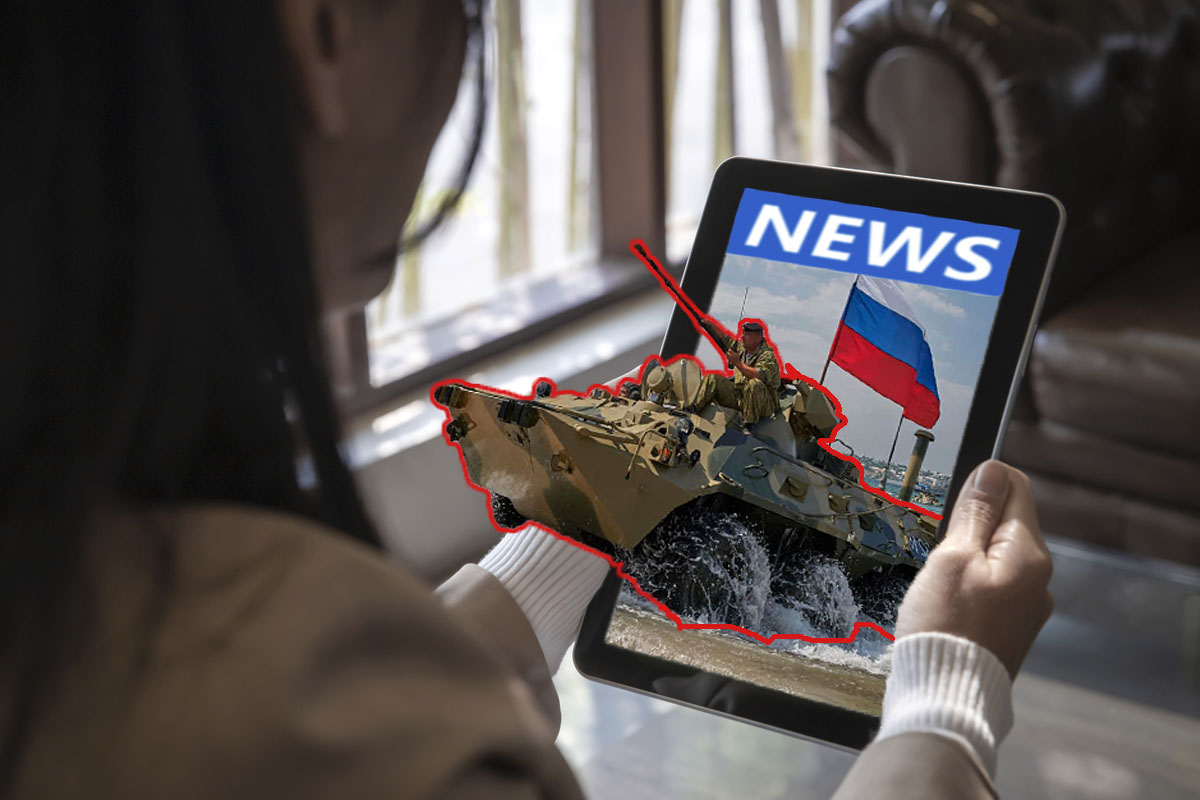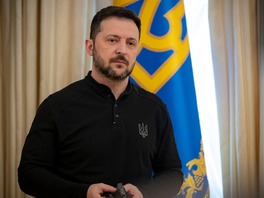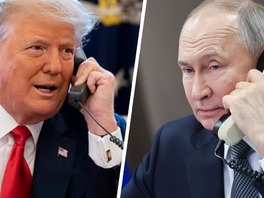The number of threatening headlines about the upcoming attack on Ukraine is on the rise. The news is becoming increasingly apocalyptic and threatening. By doing this, the media pursue several goals at once, and Apostrophe laid out which ones.
Online invasion, a new Barbarossa operation, and the "frozen ground"
Two months after the publication of the Russian invasion map with Ukrainian cities of Lemberg and Chernowitz in the German tabloid Das Bild, the same agency published a new piece outlining the hypothetical plans of the Russian President Vladimir Putin regarding Ukraine. The publication indicated that the information came from unnamed sources in the intelligence community.
The publication stressed that the scenarios described could be implemented only in case of a full-scale war, and only if the attack is successful for the Kremlin. The plan is to establish a cruel puppet government in Ukraine controlled by Moscow. According to German journalists, it would result in the creation of the "union state" including not only Russia and Belarus but also Ukraine.
Allegedly, at the first stage, the Russian army would suppress the Armed Forces of Ukraine, and then surround major Ukrainian cities with the military. After that, Russia would establish its centers of power with intelligence services and loyal politicians, who will readily surrender the cities to the occupiers. At the second stage, a puppet People's Council (replacing the Verkhovna Rada) would be formed as a "reserve government". At the third stage, Russia would start eliminating the resistance movements and building camps for Ukrainians willing to fight the regime.
In short, the plan appears to be a modern version of the Barbarossa operation. Needless to say, the passages about "camps for the detention of pro-Ukrainian activists" shocked some faint-hearted citizens. However, the experts warn against taking the international press reports literally, especially given many mistakes and fakes in the information.
The American news agency Bloomberg also tried to keep up with its colleagues, accidentally reporting that Russia had already invaded Ukraine late in the evening of February 4. After the blunder, Bloomberg apologized for the mistake and deleted the headline.
 Russian troops in Crimea
Russian troops in Crimea
“We prepare headlines for many scenarios and one of those headlines was inadvertently published at around 4 PM ET today on our website,” a Bloomberg News spokesperson wrote in an email. “We deeply regret the error.”
“The headline has been removed and we are investigating the cause,” the spokesperson added.
At the top of the most apocalyptic Ukraine predictions was Reuters. The agency, citing American officials, reported that if Russia invaded Ukraine, the latter would lose from 5,000 to 25,000 servicemen, and Kyiv would be taken within two days.
In addition, Washington estimates that Russia would lose between 3,000 and 10,000 soldiers. At the same time, the total losses of the civilian population could range from 25,000 to 50,000 people. It was also reported that the Russian military was at the 70% readiness level needed for a full-scale Ukraine invasion. Over the past two weeks, the number of battalion tactical groups in the border region has increased to 83 from 60 as of Friday, and 14 more are in transit.
Additionally, according to Reuters, the ideal timing for Russia's attack is February, because "the ground is expected to reach peak freeze around Feb. 15, allowing for off-road mechanized transit by Russian military units. Such conditions would continue until the end of March." However, the Ukrainian weather forecast for the next two weeks appears to be unavailable for Reuters. Otherwise, their journalists would know that the temperature is supposed to be above freezing until the end of the month, with light frosts only at night. There will be no deep freezing of the soil to allow forty-ton tanks to easily move off-road.
 Weather forecast in Chernihiv
Weather forecast in Chernihiv
However, information strikes are very diverse and are carried out not only by the Western media. A few days ago, a series of Russian sites revealed the ‘testimony’ of Scott Ritter, a former intelligence officer of the U.S. Marine Corps. The man described the scenario of a hypothetical conflict between Russia and the United States that may arise (attention!) in the case of Ukraine's accession to NATO and the Ukrainian attempt to return the occupied Crimea (a similar concern was also expressed by Russian President Vladimir Putin). It is indicated that in this case the U.S. Army will be defeated since it is not prepared for a conflict with Russia, poorly trained and organized. Although, it is unclear why the U.S. Army, which has the highest budget in the world, should be weak and why the prospect of Ukraine's accession to NATO is mentioned now, considering that Ukraine will not join the Alliance in the foreseeable future.
Is it hype, pressure to implement the Minsk Agreements, or raising the stakes?
According to political scientist Yuri Romanenko, the version that the media pressure is aimed at forcing Ukraine to fulfill the political part of the Minsk Agreements is quite realistic, yet there are also other reasons for unverified or frankly misleading information that are worth paying attention to.
"Western media also like to get traffic and make money on hype, and all stories about Ukraine are now selling like hotcakes - accordingly, everyone tries to make money on the story. In addition, Russia and America are now playing a game of raising the stakes. Although there has been some mitigation of the diplomatic battle, Putin continues to move his troops closer to our border. It seems logical in the context of rapprochement with China. If Beijing gave Moscow any guarantees, Russia would decrease the number of troops in the East. The western direction of the conflict is beneficial for China, while for Putin it is a priority," the expert believes.
Political scientist Vitaly Kulik agrees with his colleague and believes that the horrors of the upcoming war may push Ukraine to undesirable concessions.
"In addition, this campaign may also be a push to have Kyiv agree on certain concessions, as we constantly hear this catastrophic scenario saying Russia will attack. The threat is constantly articulated. Kyiv is pushed to negotiate, and each agreement has a price that we will have to pay. That is, the West, on the one hand, raises the stakes in its game with Russia, and on the other hand, it pushes us to negotiate with Moscow," he told Apostrophe.
According to Georgiy Pocheptsov, an information policy specialist, we do not know and cannot know the whole truth about what is happening. Each country is pursuing its own goals in this campaign, solving primarily internal issues, and Ukraine is a tool to achieve them.
 Vladimir Putin
Vladimir Putin
"With its activity on the external front, Russia compensates for the lack of success in the economy and technological development. The U.S. is covering its mistakes in Afghanistan, which is aimed at the US domestic audience, including before the midterm congressional elections in the fall. Russia cannot even position itself as an enemy of Ukraine, all the time talking about "brotherly peoples". Therefore the Kremlin juxtaposes Ukrainian authorities as the enemy," the expert notes.
At the same time, one can assume that Western intelligence agencies are indeed leaking some of the information to journalists, resulting in the metaphorical schizophrenia that has been plaguing the information space for the past few months. At the same time, the probability of a large-scale war remains extremely low, even taking into account the offensive rhetoric of both Russia and its proxy, Belarus, Yuri Romanenko believes.
"There will be tension - it is obvious that the Russian army entered Belarus not only for the period of the exercises. By the way, it is worth paying attention to the role of Belarus, which turns into Russia’s proxy, just like the LDPR. And Lukashenko's latest statement about "Ukraine's return to the Slavic world" should be seriously considered as evidence for the use of Belarus in case of some provocations or even armed confrontation, which is necessary to further escalate the situation. At the same time, I do not think that the attack from Belarus is possible, as there is no respective concentration of troops, the Belarusian army itself is small and weak. They will have Russians and for the West, it will be a powerful argument for imposing sanctions as countermeasures," Yuri Romanenko claims.
It is worth noting that Kyiv still maintains the appearance of "Olympic calm", and the balance of power in our region has changed: Ukraine has received enough assistance to be able to create problems for Russians in case of an attack. Therefore, again, the statements about the upcoming Moscow offensive are still groundless.
"Recently, there was a statement by the White House that the Russian invasion is "imminent", which can be interpreted as follows: the initiators of the media campaign have not yet agreed on acceptable conditions. Let's wait for the tripartite negotiations between France, Germany, and Poland, as well as Scholz and Macron's meetings with Putin and Zelensky, and the negotiations of political advisers in the Normandy format. After that, there will be much more clarity," says Vitaly Kulik.
In general, talks about the attack reflect the degree of real physical readiness on the part of Russia, but no one knows for sure whether the offensive itself will take place.
"In Ukraine, people are already used to talks about the upcoming attack because they cannot be in a constant state of anxiety. All players get the maximum possible from this situation, as everyone uses it for their own purposes," says Gergiy Pocheptsov.
Well, all we have to do is to use the situation in the only possible way: to negotiate new supplies of Western weapons, which we already received in recent months more than in the previous few years. Using the increase of stakes in the West's game with Russia, we can quite strengthen our defense.





